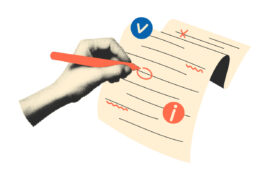Letter of recommendation: Ask someone who knows you well
When deciding on whom to ask, don’t simply think of those classes in which you have done well: think of instructors or supervisors who are most familiar with your work and achievements. Readers look for evidence of the letter writer’s familiarity with your work. Without it, letters of recommendation lack credibility.
While you might be tempted to request a college letter of recommendation from a tenured academic superstar, refrain from doing so unless you know the recommendation will be strong. An impressive signature will not compensate for a lukewarm letter.
Letter of recommendation: Ask early
Don’t wait until the last minute. Instructors are flooded with college letter of recommendation requests at the end of the semester (as well as near application deadlines), and you don’t want your letter to suffer as a result. If you approach your instructor a few months before the deadline, you will avoid putting him or her under pressure, and you give him or her plenty of time to ponder your performance. As the deadline approaches, you can always send the writer a friendly reminder of the impending deadline.
Letter of recommendation: Ask personally
When seeking letters of recommendation, don’t send e-mails or leave voicemails. It’s to your advantage to ask the person face-to-face. This conveys just how important this letter is to you.
Many instructors and supervisors deal with dozens of recommendation requests every year. Even if you are a stellar student or employee, they might not remember that smashingly astute comment you made back in March. Along with the letter of recommendation form and materials, include a vivid reminder of your past accomplishments, particularly those with which your instructor or supervisor is already familiar. You might include a resume and/or a relevant writing sample (preferably one written for that particular instructor, and one which earned you a high grade).
If you intend to study agronomy and your instructor is under the impression you are planning on pursuing astronomy, your admission readers might end up with either a hysterical or quizzical letter of recommendation. Write down your plans and goals so that your writer is aware of them.
Letter of recommendation: Provide all necessary materials
Most applications include specific forms for letter of recommendation writers. They often ask for both a written-out statement and a series of short questions. If you are asking your instructor for several versions of the letter — for instance, if you are applying to a number of schools — you might remind him or her that the statement need not be written directly on the sheet itself; it can simply be stapled to the form.
Always provide your writer with stamped envelopes. If you are asking for multiple letters, it’s a good idea to organize all the forms in one folder and include a cover sheet with a list of the schools for which you are requesting letters. Remember to include envelopes of the appropriate size, and overestimate the amount of postage (the instructor might attach extra pages to the form). Some applications require the instructor to return the letter to you in a sealed envelope. Ask the writer to sign the flap of the envelope.
Finally, you might consider providing the letter writer with a USB flash drive for saving a copy of the letter. Letters, after all, have been lost in the mail (both the physical and digital versions) before — not to mention in admission offices — and there’s always a chance you might have to ask for a second copy to be sent out.
Letter of recommendation: Waive your right to read the letter
Federal law grants you access to your letters of recommendation, but many applications include a form where you can waive your rights to read the letter. We highly recommend that you do so. This reassures the reader that the instructor has written a candid letter. Studies have shown that confidential letters carry far more weight. In addition, writers are far more comfortable writing a complete, candid letter when they know the applicant will not have access to the text. If you fear that the letter writer might not do justice to your achievements or might include negative information — well, that’s a good sign you should not be asking that person for a letter of recommendation.
Letter of recommendation: Send a thank-you note
Always send your writer a thank-you note after you know the letter has been sent out, whether or not you have heard from the school. Don’t wait too long to do this: a week or two is a good timeline.
Letters of recommendation are important parts of the admissions process, and should be treated as such. For some students, these letters will be a crucial element in acceptance, and for other students they can be perfect supplements for a college interview (sometimes called an admission interview).
Need help getting started on your college search? Search by location, major, admission difficulty, and more with Peterson’s College Search.



